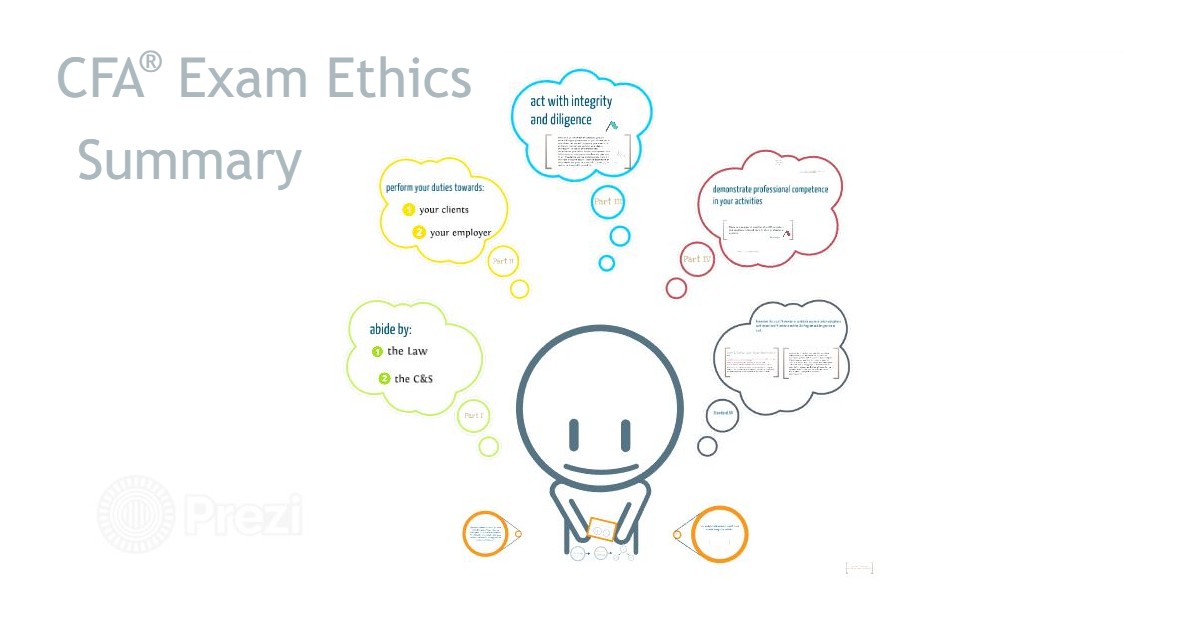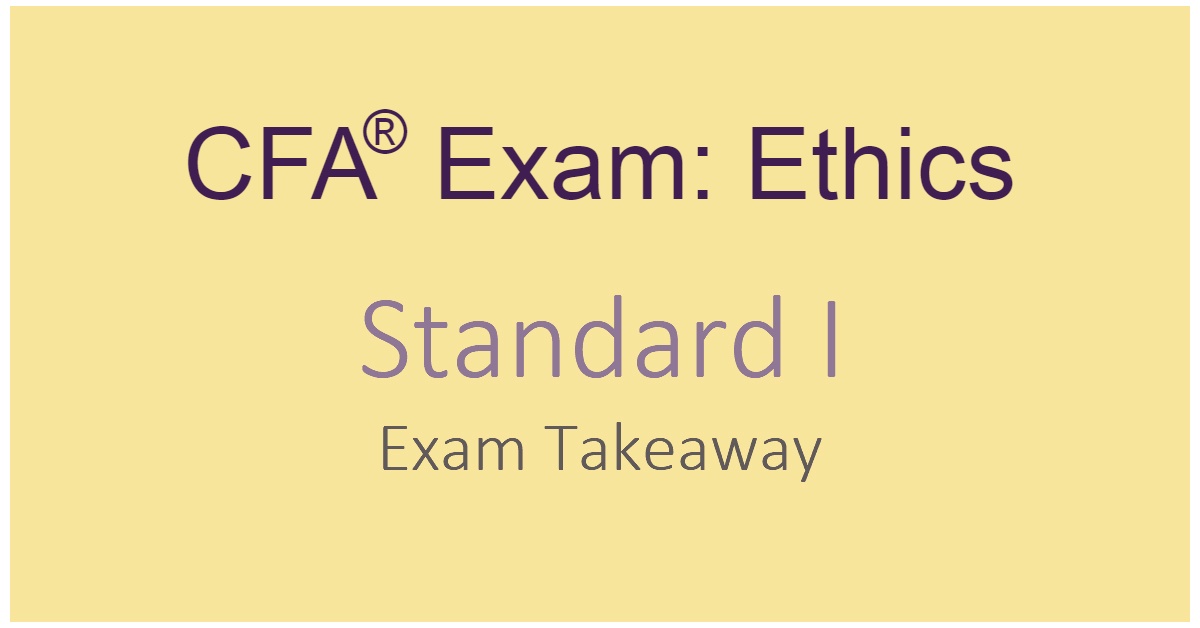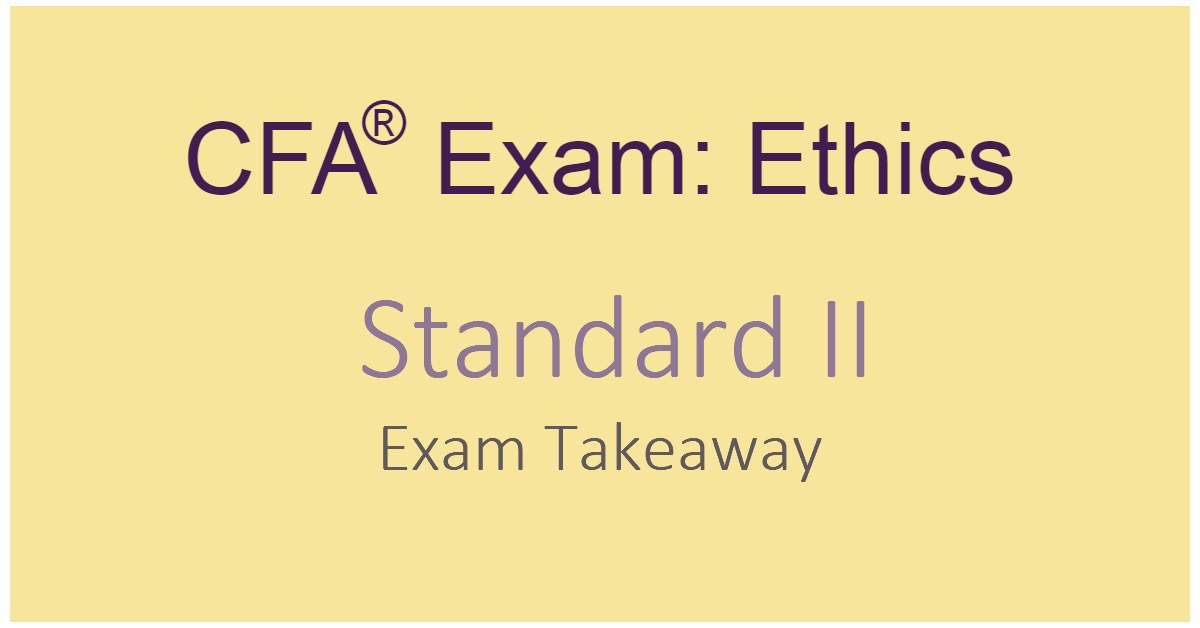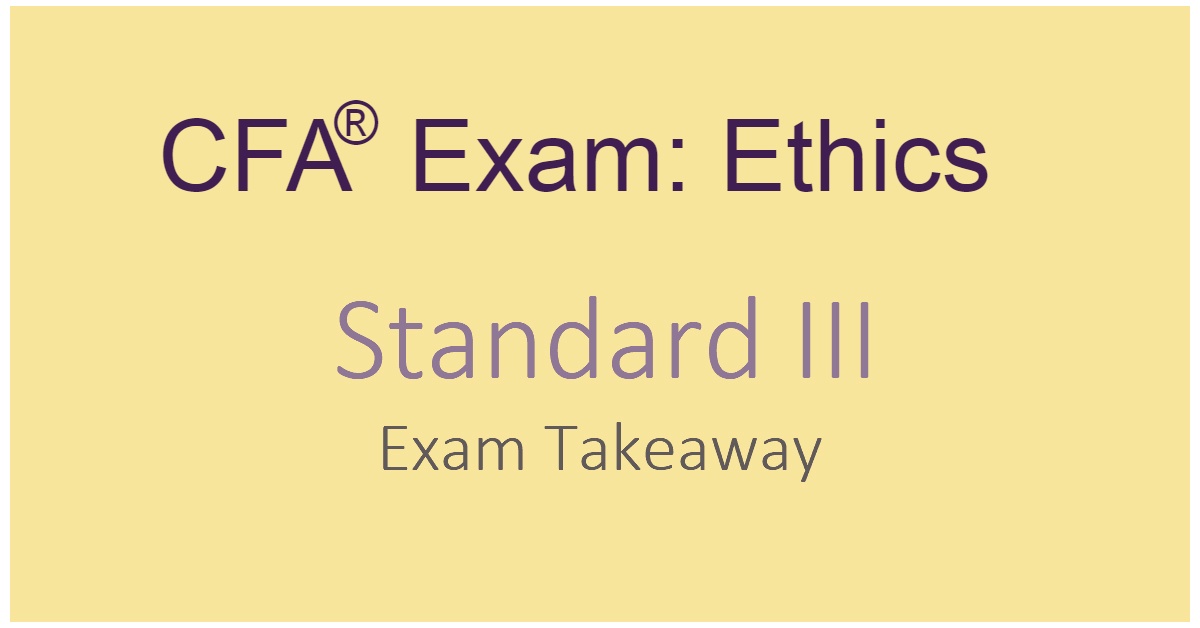Level 1 CFA® Exam Ethics Summary

The Basics of Level 1 CFA Exam Ethics
Each level 1 CFA exam candidate must know the Code of Ethics and the 7 Standards of Professional Conduct. The Ethical Standards are devoted to separate areas of the investment profession. The Standards cannot, however, be used selectively. They are closely interwoven and you need to see them as a whole. The Code of Ethics provides guidelines you should follow at any time and place.
This blog post was created as a part of the CFA exam review series to help you in your level 1 exam revision, whether done regularly or shortly before your CFA exam.
Level 1 Ethics Cheat Sheet
Here's a cheat sheet for you to fall back on when studying Ethics for your level 1 CFA exam. It all boils down to the 6 principles of the CFA Institute Code of Ethics and the 7 Standards of Professional Conduct. However, remember that it's not that easy – the devil is always in the details.
CFA Institute Code of Ethics
CFA Institute Code of Ethics is a set of principles and moral rules agreed on and accepted by investment professionals.
There are six major principles included in the CFA Institute Code of Ethics that generally correspond to the following moral obligations:
- Act in a morally acceptable manner and to the best of your abilities in any of your professional relationships.
- Always place the good of your profession and of your clients first.
- Stay independent and exercise reasonable care in your professional activities.
- Practice in an ethical way that earns you an honest reputation and encourage others to do so.
- Promote the integrity of the market.
- Maintain and improve your competence and encourage others to do so.
You can learn more about CFA Institute Code of Ethics & Standards of Professional Conduct by visiting our CFA exam lesson on Ethical Standards .
Standards of Professional Conduct
There are seven ethical standards. CFA Institute calls them Standards of Professional Conduct and they talk about the following areas:
- Standard I: Professionalism
- Standard II: Integrity of Capital Markets
- Standard III: Duties to Clients
- Standard IV: Duties to Employers
- Standard V: Investment Analysis, Recommendations, and Actions
- Standard VI: Conflicts of Interest
- Standard VII: Responsibilities as a CFA Institute Member or CFA Candidate
CFA Exam: Ethics Summary Presentation
Below you can watch the summary of the CFA exam Ethics created by our team. We hope you like it and find it useful. This summary was prepared to complement our CFA Exam Study PLANNER and can be used by candidates of all levels of the CFA exam.
The presentation is about the CFA Institute Code of Ethics & Standards of Professional Conduct and was prepared in Prezi.
Level 1 CFA Exam Professional Standards in Detail
When defining the Standards of Professional Conduct we might say that they provide a comprehensive description of best practices and moral duties for investment professionals.
Each of the 7 standards as included in your CFA curriculum has a number of sub-sections that specify acceptable ethical conduct and responsibilities applicable to particular profession-related situations.
Standard I: Professionalism
- (A) Knowledge of the Law
- (B) Independence and Objectivity
- (C) Misrepresentation
- (D) Misconduct
- (E) Competence
learn more: Standard I, Summary & CFA exam lesson on Ethics, Standard I
Standard II: Integrity of Capital Markets
- (A) Material Nonpublic Information
- (B) Market Manipulation
learn more: Standard II, Summary & CFA exam lesson on Ethics, Standard II
Standard III: Duties to Clients
- (A) Loyalty, Prudence, and Care
- (B) Fair Dealing
- (C) Suitability
- (D) Performance Presentation
- (E) Preservation of Confidentiality
learn more: Standard III, Summary & CFA exam lesson on Ethics, Standard III
Standard IV: Duties to Employers
- (A) Loyalty
- (B) Additional Compensation Arrangements
- (C) Responsibilities of Supervisor
learn more: CFA exam lesson on Ethics, Standard IV
Standard V: Investment Analysis, Recommendations, and Actions
- (A) Diligence and Reasonable Basis
- (B) Communication with Clients and Prospective Clients
- (C) Record Retention
learn more: CFA exam lesson on Ethics, Standard V
Standard VI: Conflicts of Interest
- (A) Disclosure of Conflicts
- (B) Priority of Transactions
- (C) Referral Fees
learn more: CFA exam lesson on Ethics, Standard VI
Standard VII: Responsibilities as a CFA Institute Member or CFA Candidate
- (A) Conduct as Members and Candidates in the CFA Program
- (B) Reference to CFA Institute, the CFA Designation, and the CFA Program
learn more: CFA exam lesson on Ethics, Standard VII
Level 1 GIPS Standards
Apart from the 7 Standards of Professional Conduct, you must also know the Global Investment Performance Standards (GIPS) for your level 1 CFA exam.
learn more: CFA exam lesson on GIPS
The general idea behind the Standards has not changed since their creation in the 1960s. All members and candidates are obliged to obey the provisions of the Code of Ethics and the Standards of Professional Conduct. Any violations may result in appropriate disciplinary sanctions including, but not limited to, the exclusion from the CFA Program or the revocation of the CFA designation.
About Soleadea:
Our CFA Exam Study Planner is available to candidates of all levels at groundbreaking Pay-What-You-Can prices. You decide how much you want to pay for our services. After you activate your account, you get unlimited access to our Study Planner 4.0 with study lessons inside, various level 1/level 2 study materials & tools, regular review sessions, and a holistic growth approach to your preparation. Join
Read Also:





Comments
nice presentaion
Nice presentation but we should add some cases to be closer to the concepts